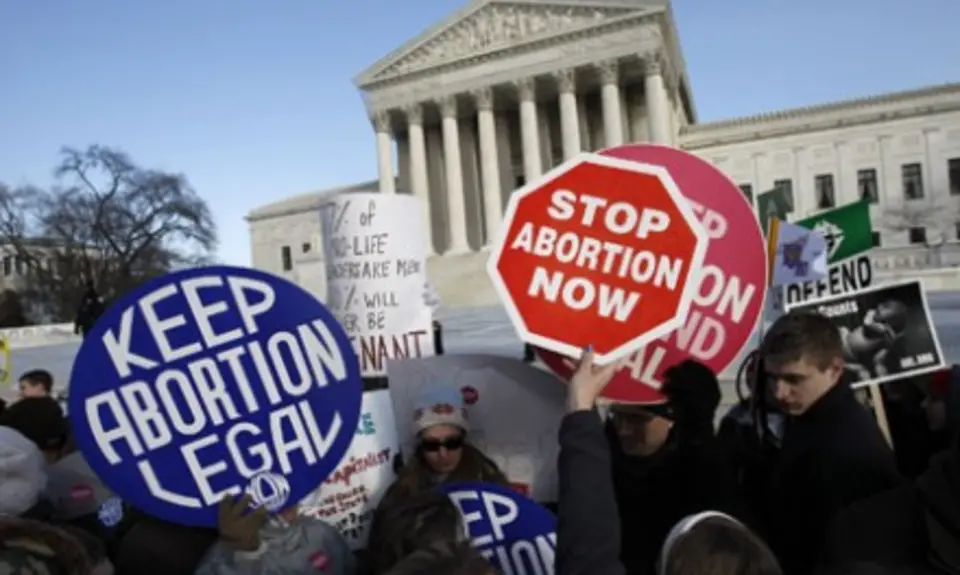This year’s Evangelicals for Life conference, built around Friday’s anti-abortion-rights “March for Life,” wrapped up on Saturday morning with a set of breakout sessions. Two speakers from Alliance Defending Freedom, a huge Religious Right legal group with a growing global reach, talked about the group’s plan to overturn Roe v. Wade and pass laws banning abortion at the state level.
“We have a plan to make Roe irrelevant or completely reverse it,” said Kevin Theriot, vice president of ADF’s Center for Life. Denise Burke, senior counsel at ADF, said that she is “really excited” about the strides that are being made to “eradicate Roe.”
“We have a strategic plan, that is a comprehensive, start-to-finish, from when we’re considering legislation all the way up to the Supreme Court, to challenge Roe,” said Burke. Among the reasons for ADF’s optimism is the confirmation of Supreme Court Justice Neil Gorsuch and so many Trump nominees to the federal appeals courts, which ADF believes will lead to courts granting approval to state laws further restricting access to and ultimately banning abortion.
“We got abortion on demand in this country because of a bunch of lies that the court bought, that the media bought, and we have to work very, very hard to dispel those lies,” Burke said. ADF’s strategy to “take those legs out from under Roe, one by one” relies on building the case that abortion is bad for women and drawing on ultrasounds and medical advances in the understanding of fetal development to convince courts to allow greater restrictions and then bans on abortion.
“And we are focusing right now on two specific types of abortion bans,” Burke said. “So we’re not looking at regulation, we’re actually looking to enact abortion bans.” The first step, she said, is to enact state bans on abortion after 15 weeks into a pregnancy, which essentially limits abortion to the first trimester. She said that most of the 20-week bans passed at the state level have not been challenged in court, because the “abortion industry” fears a bad decision. With a 15-week limit, she said, “we’re kind of basically baiting them—come on, fight us on turf that we have already set up and established.”
Burke said the first 15-week legislation had just been introduced in Mississippi, adding that “we have very carefully targeted states based on where we think the courts are the best, where we think the governors and the A.G.s and the legislatures are going to do the best job at defending these laws.”
She said, “once we get these first-trimester limitations in place, we’re going to go for a complete ban on abortion except to save the life of the mother.”
Burke noted that the trend for women having abortions is toward using drugs like RU-486 rather than a surgical method, something she acknowledged would be “harder to regulate and police.” But she assured attendees that ADF is “looking into solutions for that.”
Both Theriot and Burke said the movement also needs to be working in parallel to change hearts and minds, including those of people living in predominantly pro-choice states, to prepare for the “50-state battle” that will commence the day after Roe is overturned. The legislative and legal push Burke outlined will be coordinated with media and public relations campaigns, they said.
Theriot also spoke about one of ADF’s major ongoing cases, a challenge to a California law that requires licensed pregnancy centers to inform women via signs in their lobbies that state-subsidized contraception and abortion is available elsewhere. ADF and the clinics it represents portray this as unconstitutional forced speech. But Burke spoke positively about state laws that in the name of informed consent require abortion providers to give clients information about alternatives to abortion, which in some cases include lists of pregnancy centers. Burke said the group is gathering what she said is growing “medical evidence” of “abortion’s harms to women” and said that laws requiring abortion providers to inform women of these risks can help “advance a pro-life ethic”; in 2016, Broadly published a rundown of state laws that require abortion providers to provide women with ideological and often medically inaccurate information.
ADF is one of the giants of the Religious Right movement, with a budget of more than $50 million; Theriot said the group has 250 employees and 3,000 allied attorneys it can draw on and pay to take cases in addition to those handled in-house. Journalist Sarah Posner, writing for The Nation, recently published an in-depth investigation of ADF and its influence in state and federal governments and, thanks to the Trump administration, increasingly within the federal judiciary.





